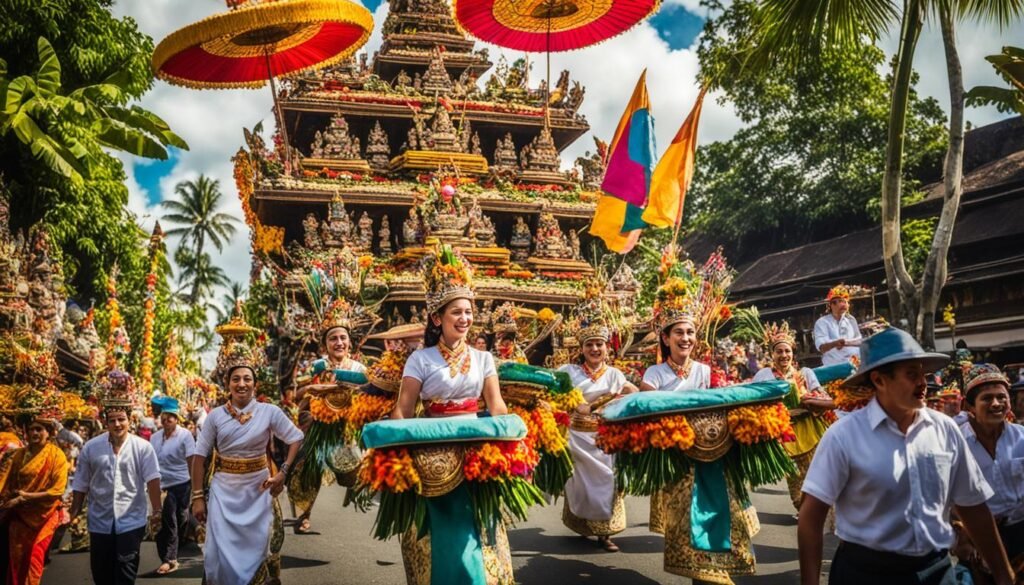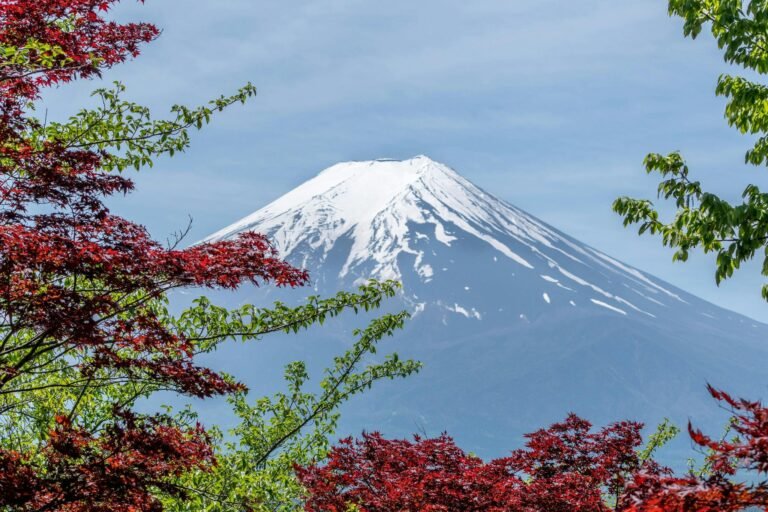Bali, the island paradise in Indonesia, is a captivating destination that beckons travelers with its breathtaking landscapes, vibrant customs, and rich cultural traditions. But have you ever wondered what lies beneath the surface of this enchanting island? What secrets do the Balinese people hold, and how do their beliefs and practices shape their daily lives?
As an avid explorer of cultures, I’ve been fascinated by the unique identity of Bali. Nestled in the heart of the Indonesian archipelago, this island stands apart from the rest of the country, where Islam is the dominant religion. Instead, Bali is a bastion of Hinduism, a legacy that has been preserved through centuries of history and tradition.
Delving into the spiritual essence of Bali, I’ve discovered a world where the divine and the earthly coexist in perfect harmony. From the ornate temples that dot the landscape to the intricate rituals that permeate every aspect of life, the Balinese people have woven a tapestry of faith, art, and community that is truly captivating.
Key Takeaways
- Bali is renowned for its rich Hindu heritage, setting it apart from the predominantly Muslim Indonesia.
- Balinese culture is deeply rooted in the philosophy of Tri Hita Karana, emphasizing harmony with God, people, and nature.
- Balinese art and architecture reflect the island’s spiritual essence, incorporating Hindu and Javanese influences.
- Daily offerings and rituals are an integral part of Balinese life, showcasing their devotion and reverence.
- Balinese customs and etiquette, such as avoiding pointing with fingers and using the right hand for gifts, are essential for visitors to understand.
Immersing oneself in the rich tapestry of Balinese culture is a transformative experience. Join me as we uncover the hidden gems of this island, from the captivating art forms to the enchanting spiritual practices that have captivated the hearts of travelers for centuries.
Introduction to Balinese Culture
Bali’s unique identity is deeply rooted in its rich cultural heritage and spiritual essence. The island is adorned with countless Balinese temples, ranging from small village shrines to majestic complexes, each with its own significance and rituals. Balinese people hold religious ceremonies and festivals throughout the year, celebrating various occasions like Galungan, Nyepi (the Day of Silence), and Odalan (temple anniversaries). These ceremonies involve colorful processions, traditional dances, and offerings to the gods, creating a vibrant tapestry of faith and devotion.
Bali’s Unique Identity
The heart of Balinese culture lies in its spirituality. Balinese Hinduism is the predominant religion on the island, and its influence is evident in every aspect of daily life. From the intricate Balinese rituals and ceremonies to the iconic Balinese temples, the Balinese people have woven their ancient traditions into the fabric of modern life.
Spiritual Essence of Bali
Balinese Hinduism, officially known as Agama Hindu Dharma, was influenced by refugees from Java, with the majority following the Shaivism tradition, although a minority follows Vaishnavism. The Balinese people worship a pantheon of gods and goddesses, including Sang Hyang Widhi Wasa and Trimurti, and Balinese culture celebrates various life milestones with unique rituals. The practice of religion involves daily offerings, with about 15 canang sari (simple offerings) placed in family compounds each day.
| Key Facts About Balinese Culture | Data |
|---|---|
| Balinese dancers start training at the age of 7 | Data Source: N/A |
| The Bakti Negar form of Pencak Silat is practiced in Bali | Data Source: N/A |
| Bahasa Bali, the official language of Bali, is fading out with many Balinese preferring Bahasa Indonesia | Data Source: N/A |
| Wayang Kulit, Balinese shadow plays, is a UNESCO award-winning aspect of Balinese culture | Data Source: N/A |
| According to the 2010 census, 83% of the Balinese population adheres to Hinduism, with regional differences showing that in Central and East Bali over 90% are Hindu while in Jembrana or Denpasar, about 30% of the population is Muslim | Data Source: 2010 census |
Art and Performance in Balinese Culture
Bali, the enchanting island in Indonesia, is renowned for its rich artistic heritage that permeates every aspect of life. From the captivating Balinese dance to the mesmerizing Balinese music and the vibrant Balinese painting, the island’s cultural expressions are a testament to the deep-rooted spiritual essence of the Balinese people.
The art of Balinese dance is a spellbinding narrative, where dancers gracefully tell ancient stories and epics, often accompanied by the haunting sounds of the gamelan, a traditional ensemble of percussion instruments. These captivating performances are deeply intertwined with the island’s religious ceremonies, reflecting the Balinese principle of “Bhineka Tunggal Ika” – unity in diversity.
Balinese painting is another hallmark of the island’s artistic prowess, with intricate and colorful works that often depict mythological tales or scenes from everyday life. Balinese artists draw inspiration from the natural world and their profound spiritual beliefs, creating stunning pieces that capture the essence of Bali’s soul.

The preservation and evolution of Balinese art forms are of utmost importance, and organizations like Mekar Bhuana have been working tirelessly to ensure the passing down of traditional performing arts to the younger generation. Through initiatives like dance, music, and mask carving workshops, the rich cultural heritage of Bali continues to thrive and inspire both locals and visitors alike.
“Balinese art and culture are centered around offerings, embodying the principle of ‘Bhineka Tunggal Ika’ which stresses unity in diversity.”
As I immersed myself in the Balinese cultural experience, I had the privilege of witnessing the intricate interplay between art, performance, and spirituality. From attending sacred dance ceremonies to observing the craftsmanship of gamelan instrument-making, I gained a deeper appreciation for the multifaceted nature of Balinese creativity and its profound connection to the island’s way of life.
Whether it’s the graceful movements of a Balinese dancer, the haunting melodies of the gamelan, or the vibrant strokes of a Balinese painter, the artistic expressions of this island nation serve as a powerful reminder of the enduring spirit and resilience of Balinese culture.
Balinese Hospitality and Social Customs
Bali, the enchanting island in Indonesia, is renowned for its warm and welcoming Balinese hospitality. As a visitor, you’ll be greeted with genuine smiles and a deep sense of openness, making you feel right at home in this exotic paradise. The Balinese people’s innate friendliness and genuine care for their guests are truly remarkable.
At the heart of Balinese social customs lies the concept of “Tri Hita Karana,” which translates to “three causes of well-being.” This philosophy emphasizes the importance of harmony and balance between humans, nature, and the divine. As a traveler, it’s essential to respect and appreciate this guiding principle during your stay in Bali.
Cultural Etiquette for Travellers
When exploring the cultural richness of Bali, it’s important to observe certain etiquette and customs to show respect for the local way of life. Here are some essential tips:
- Dress modestly, especially when visiting temples or attending religious ceremonies. Avoid revealing clothing that may be considered disrespectful.
- Remove your shoes before entering a temple or someone’s home as a sign of humility and cleanliness.
- Avoid pointing with your index finger, as it is considered impolite in Balinese culture. Instead, use an open hand or your thumb to gesture.
- Be mindful of your behavior during religious ceremonies and festivals, and follow the lead of the locals to ensure you don’t inadvertently cause offense.
By embracing Balinese cultural etiquette and social customs, you’ll not only deepen your understanding of this remarkable island but also contribute to the preservation of its rich heritage. Your respectful and considerate behavior will be greatly appreciated by the Balinese people, allowing you to fully immerse yourself in the beauty and wonder of Bali.
| Balinese Cultural Etiquette | Explanation |
|---|---|
| Modest Dress | Wear clothing that covers your shoulders and knees when visiting temples or attending religious ceremonies. |
| Shoe Removal | Take off your shoes before entering a temple or someone’s home as a sign of respect and cleanliness. |
| Pointing Gestures | Avoid pointing with your index finger, which is considered impolite. Use an open hand or your thumb instead. |
| Behavior During Ceremonies | Be mindful of your actions and follow the lead of locals during religious ceremonies and festivals. |
“The Balinese people have a deep respect for their cultural traditions and a profound sense of hospitality. Engaging with their customs and etiquette is an essential part of truly experiencing the essence of Bali.”
Exploring Balinese Traditions
Immersing oneself in the rich tapestry of Balinese traditions is a captivating experience for travelers. From visiting sacred temples to witnessing the grace of traditional dances, these cultural encounters offer a profound glimpse into the heart and soul of this enchanting island.
Visiting Balinese Sacred Temples
Bali’s sacred temples, such as the iconic Uluwatu Temple, stand as monuments to the island’s deep spiritual essence. These architectural marvels feature vibrant, ornate designs with intricate carvings and ornate statues, each element imbued with profound meaning and cultural significance. Visitors can explore these sacred spaces, observing the devotional rituals and ceremonies that take place, gaining a deeper understanding of the Balinese people’s profound reverence for their deities and ancestors.
Witnessing Traditional Balinese Dances
Balinese dances, such as the captivating Legong, Barong, and Kecak Dance, are living embodiments of the island’s rich cultural heritage. These performances narrate ancient stories and epics through graceful movements, accompanied by the hypnotic sounds of the gamelan orchestra. Witnessing these traditional dances allows visitors to immerse themselves in the island’s centuries-old artistic traditions, fostering a newfound appreciation for the intricate relationship between movement, music, and spirituality that lies at the heart of Balinese culture.
From the majestic temples to the mesmerizing dances, exploring Balinese traditions is a transformative journey that unveils the deep-rooted spiritual and artistic essence of this remarkable island. By engaging with these cultural experiences, travelers can forge a profound connection with the Balinese way of life and leave with a greater understanding and respect for the island’s unique heritage.

Immersing in Village Life
Experiencing the authentic Balinese village life is a must-do activity for any visitor seeking to truly immerse themselves in the island’s rich cultural heritage. One such gem is the captivating Penglipuran Village, nestled in the Bangli regency of Bali. This traditional village offers a rare glimpse into the daily routines and practices that have been preserved for generations, showcasing the harmonious integration of the Balinese philosophy of Tri Hita Karana.
As I strolled through the picturesque streets of Penglipuran, I was immediately struck by the meticulously maintained traditional houses, each adorned with the distinctive Balinese architectural style. The spatial organization of the village reflects the balance between the divine, the human, and the environment – a testament to the Balinese people’s deep-rooted spiritual connection with their surroundings.
“Wandering through Penglipuran Village is like stepping back in time, where the essence of Balinese culture is palpable in every corner.”
From the intricate carvings on the temple gates to the serene courtyards where residents gather, every aspect of Penglipuran Village exudes a sense of harmony and community. Visitors have the opportunity to witness traditional Balinese practices, such as the preparation of offerings for daily rituals, and even participate in community activities, fostering a deeper understanding of the local way of life.
Immersing oneself in the vibrant Balinese village life, as exemplified by Penglipuran, allows travelers to fully appreciate the cultural richness and timeless traditions that make Bali such a unique and captivating destination. This authentic experience not only provides a profound understanding of the Balinese people but also inspires a newfound respect for the island’s enduring legacy.
Local Markets and Cuisine
Exploring the vibrant Balinese markets is a captivating way to immerse yourself in the local Balinese cuisine and culinary experiences. These traditional Balinese markets, known as Pasar, are hubs of activity, where locals and visitors alike come together to shop for fresh produce, spices, crafts, and an array of enticing Balinese local food.
Shopping and Eating at Traditional Markets
Wandering through the bustling stalls, you’ll be greeted by the enticing aromas of sizzling satay (grilled meat skewers), the vibrant colors of tropical fruits, and the friendly chatter of the market vendors. Take your time to browse the diverse offerings, from handwoven textiles to intricate Balinese carvings, and be sure to try some of the signature Balinese dishes, such as the iconic nasi campur ayam (chicken rice) or the renowned babi guling (roast suckling pig).
| Balinese Dish | Description |
|---|---|
| Nasi Campur Ayam | A mixed rice dish with various toppings, including grilled chicken, fried tempeh, vegetable curry, and sambal. |
| Babi Guling | Roasted suckling pig, a Balinese specialty that is often served during special occasions and ceremonies. |
| Sate Lilit | Minced meat skewers, typically made with chicken or fish, and flavored with a blend of Balinese spices. |
These Balinese traditional markets not only offer a glimpse into the island’s vibrant culinary culture but also serve as hubs of social interaction, where locals gather to catch up and exchange stories. By immersing yourself in these lively marketplaces, you’ll gain a deeper appreciation for the Balinese culinary experiences and the rich traditions that define this captivating island.
Balinese Culture and Ceremonies
Bali’s rich cultural heritage is deeply rooted in a vibrant tradition of ceremonies and festivals that are an integral part of daily life on the island. Ceremonies play a pivotal role in Balinese culture, serving as a means to honor the gods, ancestors, and natural elements that are revered in this ancient civilization.
Visitors to Bali have the unique opportunity to immerse themselves in the Balinese cultural events and ceremonies that unfold throughout the year. By inquiring with hotel staff or engaging with the local Balinese community, travelers can discover the upcoming cultural events and plan their itinerary accordingly. Witnessing these captivating ceremonies provides a profound insight into the Balinese ceremonies and the profound spiritual essence that permeates every aspect of life on the island.
These Balinese festivals often involve vibrant processions, traditional dances, and the presentation of intricate offerings, creating a mesmerizing cultural experience for all who are fortunate enough to witness them. From the grand celebrations of Galungan and Kuningan to the more intimate Tumpek festivals honoring specific deities, the Balinese cultural events offer a rich tapestry of traditions that showcase the island’s deep reverence for the divine and the natural world.
| Balinese Ceremony | Description |
|---|---|
| Nyepi Day | The “Day of Silence” in Balinese culture, marked by a day of soul purification where all activities cease. |
| Galungan and Kuningan | A ten-day religious holiday celebrated twice a year, focusing on the creation of the universe and honoring ancestors. |
| Pagerwesi | A day for self-reflection and strengthening defenses against evil spirits in Balinese culture. |
| Saraswati | A ceremony dedicated to the Goddess of Knowledge in Balinese culture, emphasizing divine inspiration and wisdom. |
| Odalan | Marks temple anniversaries in Bali with celebrations, offerings, prayers, and music. |
By immersing themselves in these Balinese ceremonies and cultural events, visitors to Bali can gain a deeper understanding and appreciation for the island’s rich heritage, the reverence for the divine, and the enduring traditions that have shaped the Balinese culture for generations.
Purification Rituals
Balinese culture is deeply rooted in spiritual practices, and one of the most significant rituals is the purification ceremony. At the heart of this tradition lies the Tirta Empul temple, a sacred site renowned for its healing spring waters. Visiting this “Water Temple” offers a profound opportunity to connect with the island’s rich spiritual legacy.
Cleansing the Body, Mind, and Soul
The Tirta Empul temple, located in the town of Tampaksiring, is a renowned Balinese Hindu site where devotees come to participate in the Melukat purification ritual. This ceremonial bathing in the temple’s sacred springs is believed to cleanse the body, mind, and soul, preparing the individual for spiritual enlightenment.
During the Melukat ritual, visitors immerse themselves in the holy waters, submerging their heads and bodies three times under each of the 13 fountains. These springs are believed to embody distinct energies and benefits, from physical healing to spiritual rejuvenation.
“Participating in the purification ritual at the Tirta Empul temple is a profound way to connect with the spiritual essence of Balinese culture.”

The Tirta Empul temple is a testament to the Balinese people’s deep reverence for the natural world and its healing powers. Engaging in this centuries-old purification ritual is a transformative experience, allowing visitors to immerse themselves in the Balinese spiritual practices that define the island’s unique cultural identity.
Culinary Immersion
Indulging in the vibrant Balinese cuisine is a must-do experience for any visitor to Bali. One of the best ways to dive deep into the island’s rich Balinese food culture is by taking a Balinese cooking class. These interactive culinary adventures offer a unique opportunity to learn about the distinct flavors, ingredients, and techniques that define Balinese cuisine.
Balinese Cooking Classes
During a Balinese cooking class, you’ll have the chance to venture out to a local market and explore the Balinese ingredients that are essential to the island’s dishes. From the aromatic turmeric, known for its anti-inflammatory properties, to the peppery galangal that aids digestion, you’ll gain a deeper understanding of the unique flavors that make Balinese cuisine so distinctive.
Under the guidance of experienced local chefs, you’ll learn how to prepare beloved Balinese specialties, such as the slow-cooked Babi Guling (roasted pig), the fragrant Ayam Betutu (marinated and wrapped chicken), and the vibrant Lawar (Balinese salad). These hands-on Balinese culinary experiences offer a wonderful opportunity to immerse yourself in the island’s rich food traditions and create your own authentic Balinese dishes to savor and share.
| Balinese Cooking Class Provider | Price | Highlights |
|---|---|---|
| Sadara Resort | IDR 800,000 Net per person (minimum 2 people) | Exclusive Balinese cooking class |
| Kayu Manis Cooking Class | Varies | Includes a trip to a traditional Balinese market |
| Kekeb Balinese Cooking Class | Varies | Offers Balinese home cooking classes |
| Jala Cooking Academy | Varies | Features a range of regional Indonesian cooking classes |
| The Bale Nusa Dua | Varies | Includes market visit and collaboration on recipes |
Embarking on a Balinese cooking class is a fantastic way to immerse yourself in the island’s vibrant Balinese cuisine and gain a deeper appreciation for the unique culinary traditions that have been passed down through generations.
Balinese Culture at Your Stay
When planning an unforgettable trip to the enchanting island of Bali, consider immersing yourself in the rich Balinese culture by choosing a resort that celebrates the island’s unique heritage. These resorts offer an authentic glimpse into the Balinese way of life, providing guests with opportunities to engage with the local community, participate in traditional ceremonies, and learn about the island’s captivating customs and rituals.
By selecting a Balinese resort that prioritizes cultural experiences, travelers can ensure their accommodations align with the island’s distinct identity and offer a truly memorable and enriching stay. From witnessing the intricate Balinese dance performances to exploring the island’s sacred Balinese temples, these resorts immerse guests in the spiritual essence of Bali.
For those seeking a Balinese cultural experience like no other, consider a resort that offers curated activities such as traditional Balinese cooking classes, visits to local villages, and the chance to attend ceremonial events. These immersive experiences not only deepen your understanding of Balinese hospitality but also leave a lasting impression on your heart and mind.
Embrace the opportunity to step into the shoes of the Balinese people and witness the intricate tapestry of their Balinese luxury travel traditions. By choosing a resort that celebrates the island’s rich cultural heritage, you’ll embark on a transformative journey that will forever etch the essence of Bali in your memories.
“Bali is more than just a place. It’s a state of mind – a place where the heart opens and the soul is nourished.” – Elizabeth Gilbert, Author of “Eat, Pray, Love”
The Balinese culture is deeply rooted in the island’s Hindu-animist beliefs, which have been woven into the fabric of daily life for centuries. From the intricate temple architecture to the vibrant Balinese art and performances, the island’s cultural heritage is a testament to the resilience and creativity of its people.
- Immerse in the spiritual essence of Bali by visiting sacred Balinese temples and witnessing traditional Balinese ceremonies.
- Engage with the local community and learn about the significance of Balinese hospitality and social customs.
- Discover the rich tapestry of Balinese luxury travel by exploring the island’s vibrant markets, artisanal crafts, and delectable cuisine.
By choosing a resort that celebrates the Balinese culture, you’ll have the opportunity to immerse yourself in an authentic and transformative experience that will leave an indelible mark on your heart and soul.
Conclusion
As I immerse myself in the rich tapestry of Balinese culture, I am in awe of the island’s deep spirituality, captivating artistry, and warm hospitality. Bali’s traditions have the power to transport me to a realm where the divine and the earthly coexist in harmonious balance.
From the vibrant Balinese Hinduism that permeates daily life, to the serene Buddhist sanctuaries, and the diverse cultural celebrations that dot the calendar, Bali’s spiritual essence is truly remarkable. The island’s art forms, from the intricate wood carvings to the mesmerizing Wayang Kulit puppet theater, showcase a cultural heritage that is both ancient and ever-evolving.
By embracing Balinese customs and experiences, I have gained a deeper appreciation for the unique identity of this island paradise. Whether I’m wandering through the verdant rice terraces, offering prayers at sacred temples, or witnessing the graceful movements of traditional dances, I am forever changed by the magic of Bali. This cultural immersion has enriched my Bali travel experience, allowing me to connect with the heart and soul of this remarkable destination.




